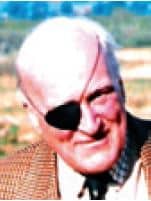Col Peter Ormrod died on 2 September 2007 at the age of 85.

He won the Military Cross at the battle of the Imjin River in 1951.
The 8th Hussars, equipped with Centurian tanks, had been sent to Korea in 1950 as part of the 29th Infantry Brigade. In April the following year, while his then ‘C’ Squadron Leader (who subsequently won the DSO) was struggling to return from leave, Peter Ormrod commanded the Squadron for the first two days of the Imjin battle.
He had already been among the first Armoured Corps Officers to move forward on foot with Infantry units to call down fire support from his own tanks onto known enemy positions.
However, during this battle, he had to sanction crews to fire onto each other’s tanks to prevent the Chinese from fixing explosives to them in order to disable the tracks. During these two days ‘C’ Squadron had taken an extravagant toll on the swarming enemy.
Later on, in the battle, he commanded half the Squadron and led them down a valley teeming with the enemy in order to protect the withdrawal of the 1st Battalions of the Northumberland Fusiliers and of the Ulster Rifles. Rushing the enemy sometimes literally, his Centurians forced their way through an estimated 2,000 milling Chinese.
Frequently, in the midst of heavy fire, he dismounted from his tank to liaise with the infantry on the ground. When he had been wounded in the head by a mortar, he continued to direct operations until evacuated.
The citation for his MC stated that his determination to get the infantry out at all costs was a major factor in the battle and had saved a great many lives. The full importance of Ormrod’s force had not been foreseen in that morning’s planning:
‘Their mission had proved vital and without their presence in the valley, their skilful management and the courage of the tank crews, the whole of the Northumberland Fusiliers and the Ulster Rifles might have been over-run.
Peter was born in 1922 at Pen-y-Lan, his family estate on the River Dee in North Wales. After leaving Harrow he did a brief stint as a civil engineer before being commissioned into the Scots Guards in 1942. While approaching the beaches on D-Day, his tank was hit by enemy fire.
He was wounded in the head and this resulted in the loss of his right eye. He was unable to return to the front until the last stages of the war in Europe. He transferred to the 8th Hussars in 1947 and was Adjutant before embarking for Korea in 1950.
He retired from the Army in 1954 to run his Pen-y-Lan estate. In spite of having only one eye, he won several point-to-points and steeplechases. He was a first-class shot and many (including this author) can remember having their eyes wiped by him often.
He immersed himself in local life, farming and forestry, becoming managing director of Flintshire Woodlands, forestry consultant to the Duchy of Lancaster and regional secretary of the Timber Growers Association. His own woods and plantations mirrored his skill in woodland management.
Peter served for many years as a JP and was High Sheriff of Denbighshire and Deputy Lieutenant for Clwyd. He never distanced himself from his military days. He was a frequent attendee at Regimental functions and his reminiscences of Korea at the 2006 Shrivenham seminar were both informative and amusing. He continued as a Territorial officer with the Royal Welch Fusiliers and became the Honorary Colonel of their 3rd Battalion.
To quote from the Daily Telegraph:
‘Col Ormrod was educated in England, enlisted in the Scots Guards, transferred to the 8th King’s Royal Irish Hussars and was later Honorary Colonel of the 3rd Battalion the Royal Welsh Fusiliers. Was this distinguished military career unique to national loyalty?’
Peter was a brave and gifted man, who through his zest for life, his ability to tell a good story and his affable manner had many friends.


